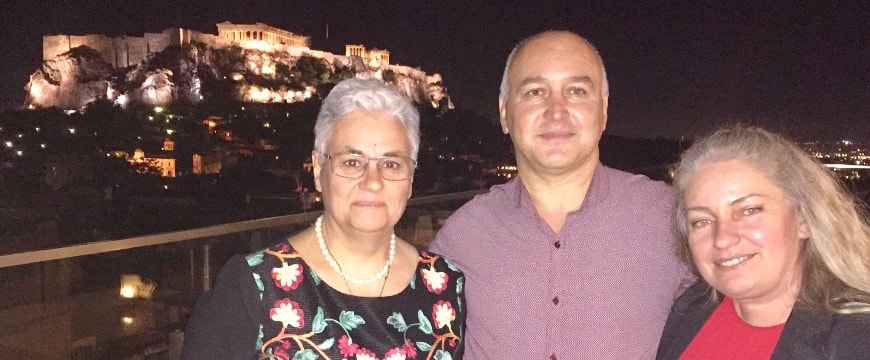Animal studies have suggested extra virgin olive oil (EVOO) may help fight off Alzheimer’s disease. Now the Greek Association of Alzheimer’s Disease and Related Disorders and Yanni's Olive Grove have begun a clinical trial in humans to evaluate the effect of EVOO on amnesic patients diagnosed with Mild Cognitive Impairment, which leads to Alzheimer’s.
A recent scientific study of mice is one of several that support the “hypothesis that EVOO could be considered as a viable therapeutic opportunity for preventing or halting Alzheimer’s disease,” as Mary Hernandez wrote in Olive Oil Times, since EVOO seems to “ward off memory loss and cognitive decline, protecting the brain from related conditions such as Alzheimer’s disease [and] Dementia.”
This substantiated the findings of other animal studies, such as one concluding that oleocanthal, a phenolic compound found in extra virgin olive oil, “has the potential to become an effective dietary supplement for reducing the risk of developing breast cancer and Alzheimer’s disease,” as Julie Al-Zoubi writes.
Most recently, the Greek Association of Alzheimer’s Disease and Related Disorders (Alzheimer Hellas) and Yanni's Olive Grove, an olive oil company in northern Greece, began the first clinical trial in humans to evaluate the effects of different kinds of olive oil on amnesic patients diagnosed with Mild Cognitive Impairment, which leads to Alzheimer’s disease when mental deterioration cannot be stopped.
Eftychia Lazarou, spokeswoman of Alzheimer Hellas, described the main criteria and procedures of this two-year clinical trial, which is called MICOIL. She explained that its 150 participating patients were divided into three groups, one given Yanni’s Fresh early harvest EVOO (with a very high phenolic content), the second given Yanni’s Selected EVOO (traditional harvest, not as many polyphenols), and the third group given nothing, but expected to eat whatever virgin or refined olive oil they generally buy at the supermarket (often very low in polyphenols). All participants were directed to consume 25 ml of olive oil twice a day, on their salad or by itself. The results will be evaluated in many medical examinations, with preliminary data to be announced in October.
Lazarou discussed the MICOIL trial at an event in Thessaloniki on May 20 focused on the ideal production of healthy high phenolic EVOOs, the use of these EVOOs in this clinical trial, and the first application of intelligent agriculture in Europe at the model olive groves that produce the olives used by Yanni’s Olive Grove.
Yanni’s Olive Grove co-founder Evi Psounou Prodromou told Greek Liquid Gold that the trial seeks to determine “whether EVOO can be a natural food-drug which can be used as a cure, and if it can help to delay the deterioration of the patient’s mental situation. In other words, if it can be a therapeutic opportunity for preventing or halting Alzheimer’s disease in its early steps. The study’s effort and our dream is to reach the patients at an early step toward Alzheimer's disease and offer them a drug which will cure them.”
The president of Alzheimer Hellas, neuropsychiatrist and professor of neurology Magda Tsolaki, reports that the risk of people with Mild Mental Disorder who are over 60 years of age developing dementia after a year is estimated to range from 12% to 16%, while the risk is 10% in those aged 70-79 years, and 25% in those 80-89 years old. Tsolaki adds that the latest medicine to be approved by the U.S. Food and Drug Administration (FDA) or the European Medicines Agency (EMA) to treat Alzheimer's disease was approved sixteen years ago, in 2001. Furthermore, the drugs used today mainly treat the symptoms, without curing the disease.
Evi Psounou Prodromou believes “we should design new drugs which could change the course of the disease.” As she explained to Greek Liquid Gold, “it is known that EVOO contains powerful antioxidant elements and at the same time protects against the appearance of dementia. There are valid indications that extra virgin olive oil can have a positive effect on conditions associated with cognitive deficits, such as ADHD and dementia. The positive effects are mainly attributed to phenolic compounds contained in olive oil, such as oleuropein, oleocanthal, and oleacein.” Oleocanthal, “the one studied most, shows some promising results in terms of nerve protection against Alzheimer's disease.”
Yanni's Olive Grove also discussed their collaboration with Alzheimer Hellas, Thessaloniki University, and Athens University at another event at the old parliament building in Athens on May 11 which emphasized the polyphenols in olive oil, especially high phenolic EVOO such as Yanni’s Fresh. There, a number of scientists talked about the value of extra virgin olive oil for human health, and the Olympia Health and Nutrition Awards were presented. Olive grower and production manager Yannis Prodromou accepted a Gold Award on behalf of Yanni’s Olive Grove for the company’s support for scientific research on EVOO and human health.
Yanni's Olive Grove is a family business located in Nea Potidaia, Chalkidiki, in northern Greece. The process, cultivation, harvesting, standardization, and export of their EVOOs and olive snacks are supervised by Gaia Epicherein and the Krinos Olive Center of the American Farm School in Greece. In the last three years, Yanni’s EVOOs received 35 quality awards at major international olive oil competitions, as well as being acclaimed as ultra-healthy EVOOs, achieving spots on the lists of the Top EVOOs of the World and the Top 100 (olive oil producing) Societies of the World for 2016.
Prodromou suggested to Greek Liquid Gold that “this study gives great hope to Alzheimer’s patients and their relatives. With God’s help, all the participants hope that this study will give excellent results, and it will offer relief.” She is grateful for the chance that has been offered to Yanni’s company “to do its duty to society, which is to offer the best to those who need it the most.”
___________
Thanks to Evi Psounou Prodromou for her help with this article, and for the photos that accompany it.



